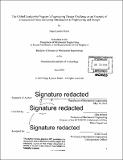The Global Leadership Program's engineering design challenge as an example of a successful cross-university introduction to engineering and design
Author(s)
Reiter, Paige Lynette
DownloadFull printable version (6.238Mb)
Alternative title
GLP's engineering design challenge as an example of a successful cross-university introduction to engineering and design
Other Contributors
Massachusetts Institute of Technology. Department of Mechanical Engineering.
Advisor
John Brisson
Terms of use
Metadata
Show full item recordAbstract
The Global Leadership Program (GLP) is a chance for approximately 35 Singapore University of Technology and Design (SUTD) students to travel to the Massachusetts Institute of Technology (MIT) and participate in a cross-university cultural and educational exchange. The students have the opportunity to collaborate with and learn from MIT's own students and faculty during the program. The highlight of the summer is a nine-week design-build course, referred to as the Engineering Design Challenge, which teaches the fundamentals of engineering design and the necessary fabrication skills to execute those designs. The challenge requires small teams to design and build a single-person electric vehicle (EV). The first two years, the challenge was to make go-karts; since then, the scale has been increased to electric boats. The design challenge is presented as a real-world engineering exercise by intentionally being open-ended and primarily student-driven. It requires the students to practice both their technical skills as well as their interpersonal, professional, and leadership skills. This sort of allencompassing, immersive approach to education is based on principles found within the Project- Based Learning (PBL) and Conceive-Design-Implement-Operate (CDIO) pedagogical frameworks. Though it has only been around since 2013, the program has had a lasting impact on both the students that participated and their peers upon their return to Singapore. Elements of MIT's own student culture were shared with the participants and successfully transplanted back to SUTD at the program's end. This sort of cross-university educational and cultural exchange has exciting implications for expanding the global engineering educational network as the world becomes more and more connected.
Description
Thesis: S.B., Massachusetts Institute of Technology, Department of Mechanical Engineering, 2016. Cataloged from PDF version of thesis. Includes bibliographical references (pages 30-31).
Date issued
2016Department
Massachusetts Institute of Technology. Department of Mechanical EngineeringPublisher
Massachusetts Institute of Technology
Keywords
Mechanical Engineering.